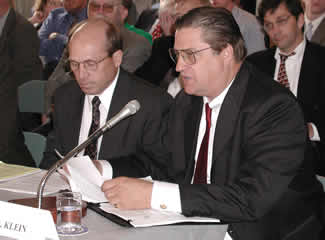|

NCGA President Lee Klein
presents testimony on NCGA's National Agriculture Security Act
(NASA) to the Senate Agriculture Committee. To his left is NCGA
Public Policy Action Team member Ron Litterer, who also presented
testimony on NCGA's
behalf. |
For Senate Agriculture Committee,
NCGA Details its Vision of the Next Farm Bill
(7-12-01)
Battle Creek, Neb.,
farmer and National Corn Growers Association (NCGA) President Lee Klein
shared NCGA's vision of the next farm bill with the Senate Agriculture
Committee today in Washington, D.C.
Joined by Ron
Litterer, vice chair of NCGA's Public Policy Action team and a Greene,
Iowa, farmer, Klein detailed what corn producers expect from the next farm
bill: "Simply, our growers want a farm program that ensures America's
farmers are globally competitive, market responsive and environmentally
responsible. This program must provide producers with access to world
markets, access to capital, access to advances in technology and risk
management in a sustainable and environmentally sound manner."
The centerpiece of
NCGA's proposal is a counter-cyclical income support program, which
today's testimony covered in considerable detail. Klein outlined for the
committee what corn growers seek: "It is NCGA's goal to develop new uses
for corn; to develop and build a renewable products industry with corn as
the chief feedstock; to increase utilization of corn; and to increase the
opportunity for grower profits."
He added that the next
farm bill should provide producers with "opportunities in the market place
with minimal interference in production decisions and that includes a
safety net against those economic forces that are beyond producers'
control," adding, "We believe we have developed a program that will do
just that."
NCGA's National
Agriculture Security Act (NASA) addresses the inequities in the current
marketing assistance loan program, puts U.S. agricultural supports in the
more favorable green box and is fiduciarily appropriate and
responsible.
Klein concluded: "We
believe we have identified very real problems with today's farm policy and
proposed a policy that we believe addresses them. We also contend that
this policy proposal is both less production- and trade-distorting than
current policy, and offers this country's farmers a real safety net when
it is needed most."
PDF
of testimony
Last
reviewed July 12,
2001 |